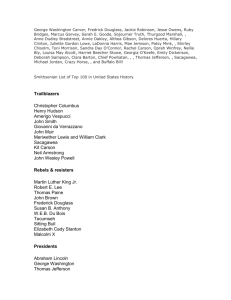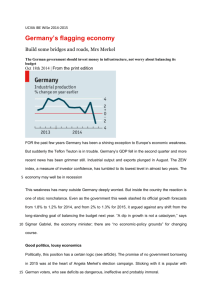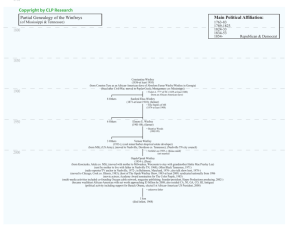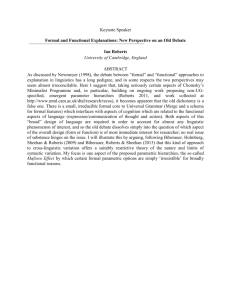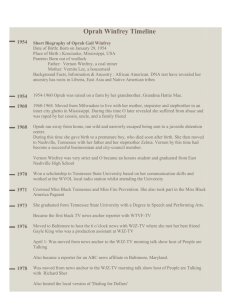Queen Elizabeth II By Catherine Mayer Helen Mirren may have
advertisement
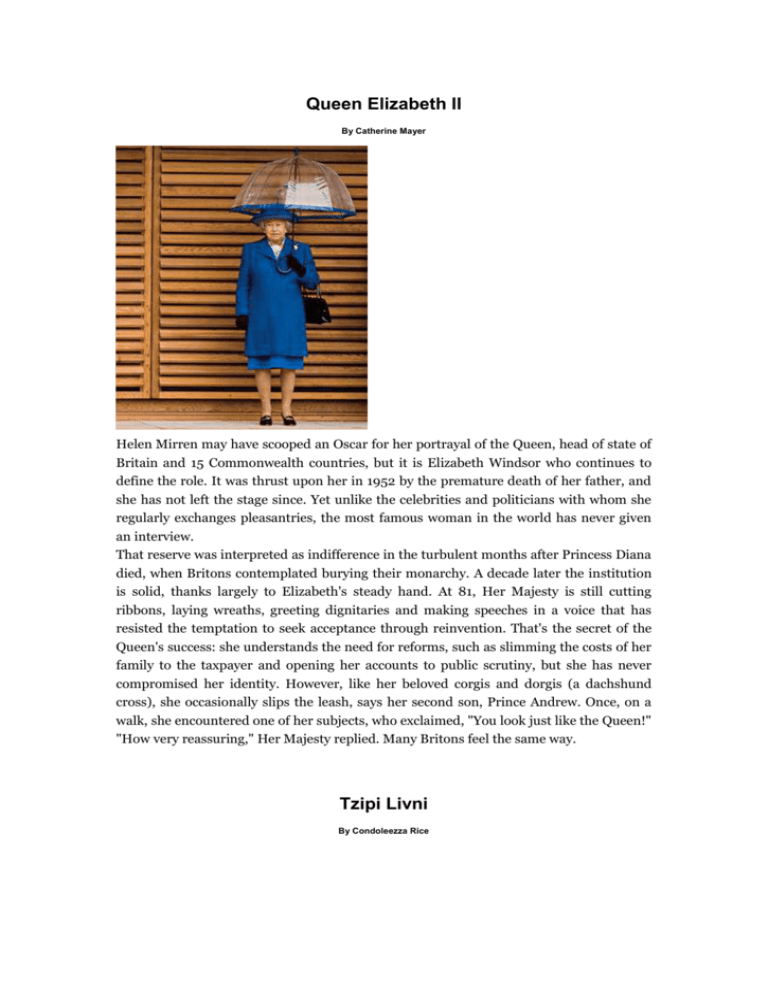
Queen Elizabeth II By Catherine Mayer Helen Mirren may have scooped an Oscar for her portrayal of the Queen, head of state of Britain and 15 Commonwealth countries, but it is Elizabeth Windsor who continues to define the role. It was thrust upon her in 1952 by the premature death of her father, and she has not left the stage since. Yet unlike the celebrities and politicians with whom she regularly exchanges pleasantries, the most famous woman in the world has never given an interview. That reserve was interpreted as indifference in the turbulent months after Princess Diana died, when Britons contemplated burying their monarchy. A decade later the institution is solid, thanks largely to Elizabeth's steady hand. At 81, Her Majesty is still cutting ribbons, laying wreaths, greeting dignitaries and making speeches in a voice that has resisted the temptation to seek acceptance through reinvention. That's the secret of the Queen's success: she understands the need for reforms, such as slimming the costs of her family to the taxpayer and opening her accounts to public scrutiny, but she has never compromised her identity. However, like her beloved corgis and dorgis (a dachshund cross), she occasionally slips the leash, says her second son, Prince Andrew. Once, on a walk, she encountered one of her subjects, who exclaimed, "You look just like the Queen!" "How very reassuring," Her Majesty replied. Many Britons feel the same way. Tzipi Livni By Condoleezza Rice It was late summer in 1999, and I was in Israel. President Bush was still Governor Bush, and I was traveling as his foreign policy adviser. In a meeting with Ariel Sharon, I met one of his advisers—a confident and impressive woman, roughly my age (well, actually a little younger), named Tzipi Livni. Little did I know how intertwined our lives and work would become. Last May, Tzipi, like me, became the second woman ever to hold her nation's top foreign policy job. Those early months were anything but easy: violence in Gaza, a war in Lebanon, a radical President in Iran. Tzipi's strength to endure, indeed to excel, in what were difficult, often heartbreaking, conditions was a testament to her character. Tzipi and Prime Minister Ehud Olmert have the foresight to know that a Palestinian state is in Israel's greatest interest, and that they must pursue the cause of peace with their Arab neighbors. President Bush and I deeply share this goal. And for Tzipi and me, it is now the focus of our work together. Tzipi has not just been my colleague; she has become my friend. We have sat together for hours debating ideas—freely, openly, even combatively at times. I have learned of her deep pride in her children. We share an abiding respect for our now deceased fathers—mine, a successful son of the old segregated American South; hers, a defender of the Jewish homeland in its first days of independence. Tzipi, 48, is a woman of conviction, intelligence and peace. I deeply respect her. I like being around her. And I know that long after we have both exited the world stage, we'll still be friends. Rice is U.S. Secretary of State Condoleezza Rice By Donna Brazile Condoleezza Rice knows who she is and remembers where she came from. Early in her tenure as U.S. Secretary of State, she brought then British Foreign Secretary Jack Straw to her home state of Alabama. She took him to the 16th Street Baptist Church in Birmingham, where four little girls had been murdered by an act of racist terrorism. She took him to the Civil Rights Institute, the South's finest museum of its worst embarrassment. And she took him to attend services at the church where her father served as pastor during the turbulent 1960s. As a child, Condi experienced personally what it is like when citizens are denied equal rights because of the color of their skin. When one of her heroes, Rosa Parks, died, Condi was in the front row at her funeral, paying homage to the woman who took a seat on a bus so that all Americans could earn a seat at the table. As Secretary of State, Rice, 52, has consistently communicated to the world that although the U.S. is a great nation, it is not perfect. While she and I don't always agree politically, I admire her courage as well as many of her values and accomplishments. She balances her active career with devotion to her family, friends and community. And she makes time to stay in touch with her Southern roots. Brazile is the author of Cooking with Grease: Stirring the Pots in American Politics John Roberts By Alan M. Dershowitz Rarely in our history has a more qualified lawyer than John Roberts been appointed Chief Justice of the U.S. At age 52, he is among the youngest Chief Justices in history. Since he is likely to preside over the high court for decades, his appointment may well be among President George W. Bush's most enduring actions. His early decisions and questions from the bench suggest that Roberts has figured out how to achieve substantive results without appearing to be results oriented or activist. He accomplishes this through the technical mechanism of "standing," which means a litigant's power to challenge the actions of the government. If a litigant lacks standing, which means the governmental action—even if theoretically unconstitutional—cannot be challenged in court. Roberts' statements suggest that he would deny standing to citizens who challenge on First Amendment grounds the Bush Administration's giving money to church groups that proselytize. He would also deny standing to those who challenge the Administration's environmental policies. We must wait and see whether Roberts seeks to apply his views of standing in a neutral manner or whether he will pick and choose depending on whether he approves of the substantive outcome. Stay tuned. Dershowitz is a professor at Harvard Law School Sonia Gandhi By Suketu Mehta Imagine if the U.S. were run by an Indian Hindu woman without a college degree. It's tough: the U.S. has never elected anyone who's not Christian, white and male—even as Vice President. But India, which is an even bigger democracy, is run in all but name by an Italian Catholic widow with a high school education. In the 16 years since the assassination of her husband Rajiv, Sonia Gandhi, née Maino, has become the face of the country's most famous family. As leader of India's Congress Party, she has also managed the largest political party in the country and steered it to power. And she has done all this wearing a sari. When her party won national elections in 2004, she was offered the prime ministership; she listened to her "inner voice" and turned it down, and anointed the economist Manmohan Singh in her stead. It was a gesture that was, well, Gandhian. And it solidified her hold on power. For ordinary Indians, this act of renunciation held tremendous mythic resonance. Though Singh is Prime Minister, it is Sonia, 60, who is the kingmaker. And her most lasting legacy may lie in her children Rahul and Priyanka, one of whom may well become India's Prime Minister someday, ascending to the high office that their mother has—thus far—renounced. Mehta is the author of Maximum City: Bombay Lost and Found Arnold Schwarzenegger By Robert F. Kennedy Jr. In an era when Republicans across the nation seem intent on tearing the "conserve" out of conservatism, California Governor Arnold Schwarzenegger, 59, is a national leader for his efforts to restore Teddy Roosevelt's conservation tradition to the G.O.P. When he took office in 2003, Schwarzenegger announced a bold action plan for improving the state's air, water, landscapes, energy supplies and climate. He created the 25 million-acre Sierra Nevada Conservancy to preserve California's iconic mountain range; established thousands of acres of ocean parks; and put millions of dollars into habitat restoration, fisheries management and pollution reduction. He also adopted the most aggressive greenhouse-gas-reduction policies on earth, including ordering the state government to slash its energy use 20% and providing $3.2 billion to put solar roofs on homes and small businesses. By 2020 one-third of California's electricity will come from renewable sources like wind, biomass and the sun. Schwarzenegger's commitment to green growth often pits him against his own political party. He has fought off the Bush Administration's efforts to weaken California's global-warming initiatives and drill for oil along the coast and in the state's national forests. A true fiscal conservative with a deep commitment to California's future, the Governor regards environmental injury as deficit spending—loading the cost of this generation's prosperity onto the backs of our children. Schwarzenegger believes that good economic policy, over the long term, is always the same as good environmental policy. Kennedy, related to Schwarzenegger by marriage, is an environmental lawyer for NRDC and president of Waterkeeper Alliance Angela Merkel By Henry A. Kissinger In 1989 Angela Merkel was working as a researcher in physics at the Institute for Physical Chemistry, East German Academy of Sciences in East Berlin. She had never participated in political activity. Then the Berlin Wall fell, and shortly afterward, Merkel joined the Christian Democratic Union of East Germany. By 2000 she had been elected chairperson of the Christian Democratic Union of a unified Germany. In 2005 she became Chancellor. Merkel's leadership style is the art of accomplishing great goals through the accumulation of nuance. Thoughtful but tenacious, she moves toward her goals with inward assurance. In foreign policy she has balanced Germany's close relations with the U.S. and the necessity of cooperation with Russia. In the rotating office of the European Union presidency, she has given a new impetus to European integration. If gradualism becomes too pervasive, she will run the risk of stagnation. But I think that Merkel, 52, will push reform to the point of inevitability, softening her determination by unobtrusiveness and an aura of competence. If that happens, Merkel will have become a German equivalent of Britain's Lady Margaret Thatcher—different in style yet comparable in results. Kissinger is a former U.S. Secretary of State HEROES & PIONEERS Oprah Winfrey By Nelson Mandela Oprah Winfrey's own story is an inspiration because she overcame almost every obstacle that a person might face. She is an icon to people all over the world because of her commitment to help those who have faced similar obstacles. We therefore salute a friend and a role model. It is said over and over, but it is always true that young people are the future. Oprah, 53, shared our views that the gains of our democracy would be nullified if we did not properly educate our children and youth. She obviously recognized the potential in our youth. The Oprah Winfrey Leadership Academy for Girls—located near Johannesburg and educating girls in Grades 7 through 12—is therefore a wonderfully appropriate gift to the people of South Africa, one that will endure over many lifetimes. When I went to the opening of her school, I looked at the shining faces of these young women and thought every one of them has the potential to be an Oprah Winfrey. The school is important because it will change the trajectory of these girls' lives and it will brighten the future of all women in South Africa. Oprah understands that in Africa, women and girls have often been doubly disadvantaged. They have had the curse of low expectations and unequal opportunities. She is a model for all of them—and for all of us—of what one person can do to make a difference in the lives of others. That is why we consider her to be one of our heroes. Mandela was President of South Africa from 1994 to 1999 http://www.time.com/time/specials/2007/time100/0,28757,1595326,00.html
